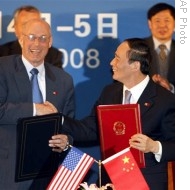voa标准英语2008-China Urges US to Stabilize Its Own Economy(在线收听)
 |
| US Treasury Secretary Henry Paulson, left, and Chinese Vice Premier Wang Qishan, right, shake hands during the US-China Strategic Economic Dialogue in Beijing, 04 Dec 2008 |
Chinese Vice Premier Wang Qishan opened the two-day Strategic Economic Dialogue by calling for the United States to stabilize its own economy.
Wang also urged Washington to protect Chinese investments in the United States.
The Chinese vice premier said China is willing to work with the United States on the most pressing issue - coping with the global financial turmoil.
Wang headed the Chinese delegation, which also included the ministers of finance, development and reform, agriculture, labor, commerce, health, environment and the central bank.
Treasury Secretary Henry Paulson led the American delegation, which included many U.S. Cabinet secretaries.
Paulson says the United States and China will work together to strengthen the global economic system. He added that there is potential for cooperation in many fields.
"We will continue to work on strategies for managing macro-economic risks and promoting balanced growth, on open investment and trade policies, including strengthening product, food and drug safety; on our respective roles in international institutions; and to strengthen cooperation in energy and the environment," said Paulson.
Neither leaders mentioned a dispute over the Chinese currency in their opening remarks.
Prior to the meeting, Paulson had indicated he would press China to let its currency, the renminbi yuan, rise in value. American companies say the Chinese government artificially maintains an undervalued yuan. They say this gives Chinese exporters an unfair advantage.
Since reforms in 2005, the yuan has gained in value 20 percent. Chinese Foreign Ministry spokesman Liu Jianchao said Beijing believes this is much better than in the past, when the exchange rate was firmly fixed by the government.
Liu says the yuan is becoming more flexible and interactive with major international currencies, and that its value is increasingly based on market demand and supply.
The twice-a-year meeting started in 2006, and represents the highest-level talks between two of the world's leading economies. Chinese media say Chinese President Hu Jintao and Premier Wen Jiabao are expected to meet with the U.S. delegation Friday.
This is the last meeting to take place under the outgoing Bush administration, which has briefed the transition team of U.S. President-elect Barack Obama on the talks. But president-elect Obama has yet to say whether he plans to continue with the current format.